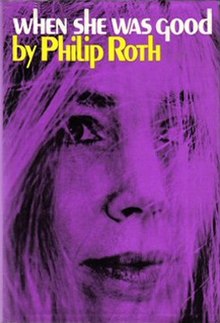 First edition First edition | |
| Author | Philip Roth |
|---|---|
| Language | English |
| Publisher | Random House |
| Publication date | May 12, 1967 |
| Publication place | United States |
| Media type | Print (hardcover) |
| Pages | 306 |
| OCLC | 31045007 |
| Dewey Decimal | 813/.54 20 |
| LC Class | PS3568.O855 W46 1995 |
| Preceded by | Letting Go |
| Followed by | Portnoy's Complaint |
When She Was Good is a 1967 novel by Philip Roth. It is Roth's only novel with a female protagonist.
Background
Set in a small town in the American Midwest during the 1940s and '50s, the novel depicts the life of a moralistic young woman, Lucy Nelson.
Plot
Below are the events of the novel written in chronological order:
Unhappy with her home life due to her alcoholic father, Will's, treatment of her mother, Lucy Nelson starts making plans to convert to Catholicism, thinking that she will find solace in the religion. After she calls the police on her father when witnessing him beating her mother, a local priest, Father Frank, implies that Lucy must repent for betraying her family, prompting her to lose interest in Catholicism.
In her senior year of high school, Lucy befriends a girl named Eleanor Sowerby, and begins dating the girl's cousin, Roy Bassart. Lucy resents Eleanor's mother because she believes that she looks down on her due to her social class, but comes to regret her animosity when Eleanor confides her in about her father, Julian's, infidelity, which she has just discovered. Lucy then comes to the conclusion that she has only been projecting her own insecurities onto Mrs. Sowerby.
Roy pressures Lucy into having sex with him; afterwards, when she is at college, Lucy experiences bouts of dizziness and vomiting, and after a visit to the campus doctor, realizes that Roy has impregnated her. Because she refuses her father's offer to pay for an abortion, Lucy is forced to drop out of college to raise her child. At one point during her pregnancy, Lucy is staying with her family and refuses to let her drunken father into the house. Consequently, he does not return until many years have passed, although it is revealed that he and his wife have, during his long absence, been corresponding via letters, which enrages Lucy's grandmother, who wants her daughter to divorce her husband and marry a kindly older man.
Lucy ultimately marries Roy and though she loves her child, is unhappy with her immature husband and her role as a housewife, leading to frequent outbursts and eventually a mental breakdown that prompts her husband to leave with their child, who has become afraid of his mother. Lucy drives to her in-laws house and demands that her child be given back to her. After being verbally abused by her father-in-law, Lucy retaliates by exposing his infidelity, only to find that her mother-in-law is already aware of his liaisons, and is seemingly indifferent to them. Unsuccessful, Lucy wanders out into the cold and freezes to death. Some time afterwards, Will returns to the Nelson residence.
Reception
In the New York Times, critic and writer Wilfrid Sheed observed Roth remains a comic novelist: “His best scenes are still his lightest, the ones you aren't looking for.” Sheed continued, “At the same time, it should be emphasized that ‘When She Was Good,’ both in its sustained theme and its detail work, is a step in class above most recent novels: up on the ledge, in fact, where stringent standards set in. Roth is a serious writer, willing to turn his face against fashion and the expected. . . Roth is one of our few important writers concerning whose future it is possible to feel anything like real curiosity.”
References
- Dubrow, Heather (August 22, 1967). "Smalltown America". The Harvard Crimson. Near Boston. Retrieved May 6, 2021.
- Sheed, Wilfrid (June 11, 1967). "Pity the Poor Wasps". The New York Times. New York City. Retrieved May 6, 2021.